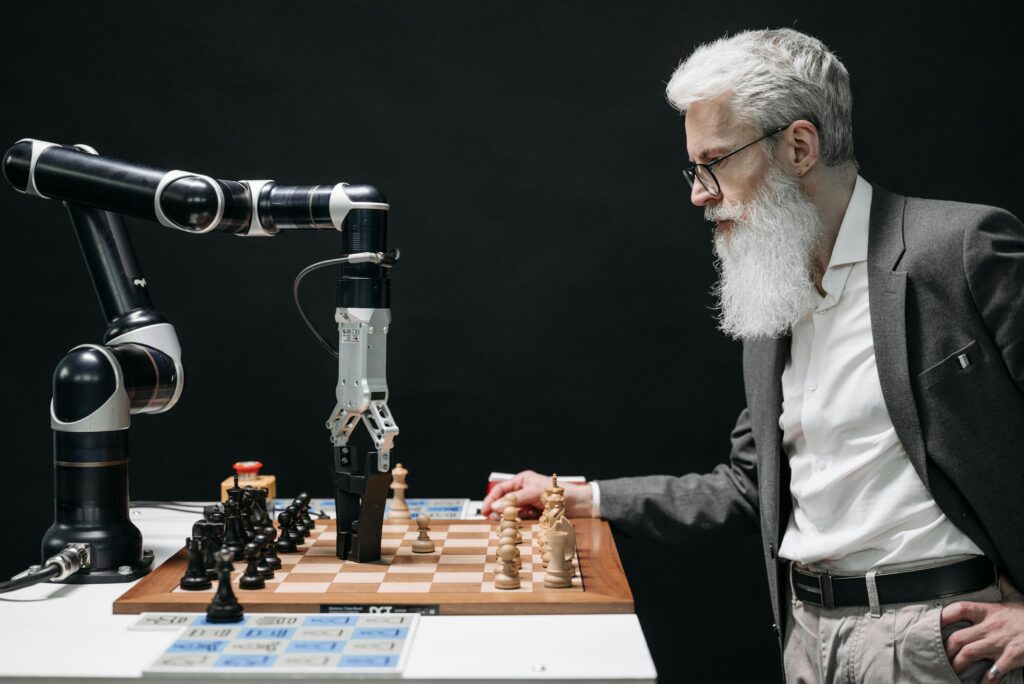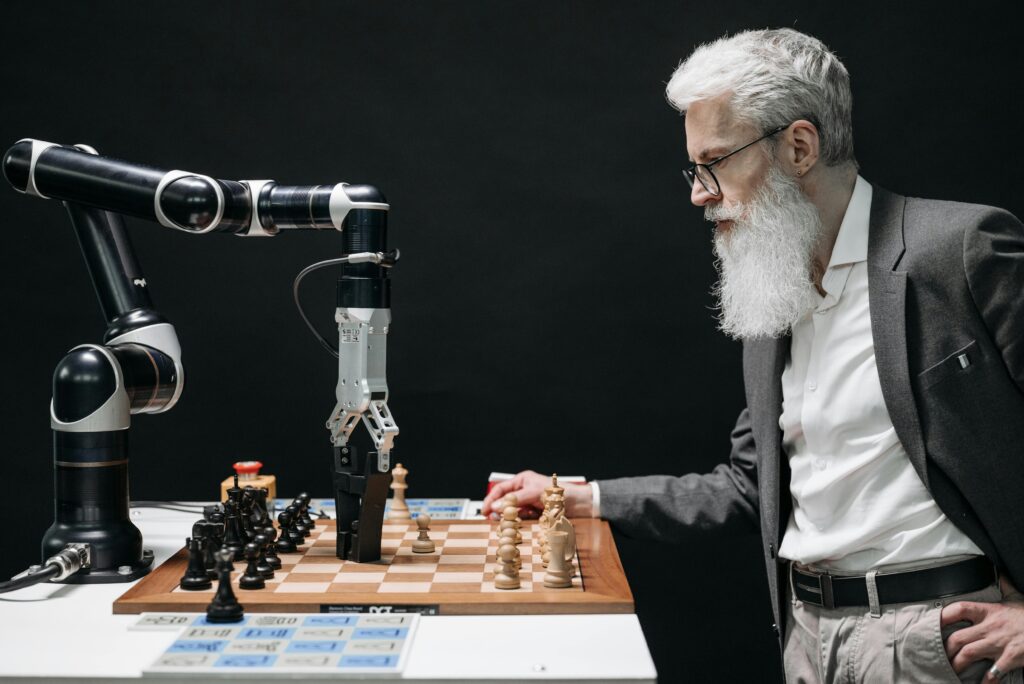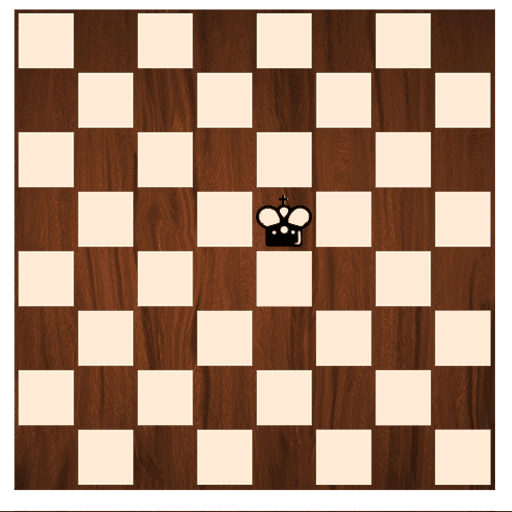

Chess, an old game of strategy and mental power, has long been regarded as an emblem of human Intelligence and mental capacity. In the last few years, Artificial Intelligence has progressed significantly and has been applied to many domains, including the ancient game of Chess.
The Evolution of Chess and Technology
The rise of Chess and technology has always been closely intertwined. In the 1950s, early computer people started experimenting with machines that could play Chess. At first, they were crude and could barely beat a beginning human player. However, a lot has changed in computing power, algorithms, and machine learning, with AI systems able to play Chess and outplay world champions. Here, technology has progressed, and this has redefined Chess.
Now, we are talking about the Early Days: IBM’s Deep Blue.
In 1997, the reigning World Chess Champion, Deep Blue, moved up by conquering Garry Kasparov. This was a turning point in the history of AI and Chess. Deep Blue was a computer optimized to calculate gigantic numbers of Chess moves in record time through the brute force of computing power to calculate millions of possibilities.
AI’s Role in Modern Chess
In modern times, AI is at the heart of every element of Chess. Chess engines have programs like Stockfish and AlphaZero dominate them and greatly assist players when analyzing positions, strategies, and techniques. These engines produce evaluations of positions nearly beyond human comprehension down to astonishing depths, with high accuracy. Besides analysis, they present [a new approach] to Chess regarding creativity and new ideas. But with, the presence of AI, allows players to have more advanced and ‘informed’ strategies.
AlphaZero: A Revolutionary Approach
This is all courtesy of Chess AI developed by DeepMind, AlphaZero. Unlike other engines that must start with human knowledge or open books, AlphaZero learned Chess from self-play, getting better by playing against itself. It took only a few hours to surpass traditional engines like Stockfish in performance.
Impact on Chess Grandmasters
AI’s impact in the game of Chess has caused immense turbulence among the top tier of players: grandmasters. The machines are performing higher than the pinnacle of human achievement these players once were. Although many grandmasters have adopted AI, whether using it to study their games or develop their strategies, grandmasters are still concerned with how the game will change. The influence of AI has made players rethink how they have always played the game and evolve their way of interacting with it.
AI and Chess Training: A New Frontier
AI has opened a new way for training and improvement for amateur players. For those who play Chess, engines are an invaluable resource where the player can learn from his errors, study combinations, understand harder positions, etc. One of them is using programs like Chess Base and online platforms, in which AI powers some to provide personalized lessons, interactive puzzles, and performance feedback. Access to computers and cell phones, to name a few, can allow the kids to learn how to play Chess and adapt to their skill level, once only available via expensive resources and personal coaching.
The Role of AI in Chess Strategy
AI can analyze chess openings, mid-game tactics, and endgame techniques to force its players to rethink their game plans. Traditionally, old human experience and tradition gave certain openings more effectiveness. However, there are variations and responses provided by AI engines that have been suggested and are now highly studied and accepted. Drunk on suggestions, these suggested ideas have led to the discovery of new positions and strategic combinations that have greatly advanced the extent and breadth of the corpus of chess knowledge, adding depth and complexity to the game.
Chess as a Human-Machine Collaboration
AI has transformed competitive Chess but simultaneously created a period where humans work with machines. Chess players now pursue professional victories alongside AI through joint operations that enhance their skills and expand their knowledge base regarding the game. The joint operation between humans and AI systems brings improved performance results since leading chess players frequently employ AI tools both for match preparations and opponent pattern analysis. Integrating human imagination with machine computational power produces advanced levels of chess performance for individual players and the entire chess domain.
AI in Online Chess Platforms
Non-professional and professional chess players experience enhanced online gameplay because AI integration has dramatically improved platform functionality. Some online platforms employ AI chatbots, which can play casual games or lead discussions, enabling worldwide users from all skill levels to participate in chess-based interactions.

The Ethical Dilemma of AI in Chess
The rising power of AI in Chess demonstratively induces essential ethical inquiries that focus on fair practice and dishonest conduct. The availability of powerful chess engines during competition has generated increased online cheating incidents because players continuously face the attraction to use them during competitive matches. Chess organizations and tournament managers created new verification procedures to protect gaming standards in competitive matches. AI’s continuous development requires ethical restrictions that protect fairness and eliminate unconscionable benefits.
Artificial Intelligence has changed how players approach the study of chess opening principles.
Chess players have accumulated classical knowledge about opening theory throughout centuries. Opening preparation transforms because of fundamental changes introduced by AI technology. Computers process an extensive number of opening variations, which produce fresh ideas and previously unknown potential moves. Chess players depend on artificial Intelligence to examine opening strategies because engines generate new lines that test established principles of Chess.
The Psychological Impact of AI in Chess
Implementing AI technology in Chess produces technological progressions and psychological effects on the players involved. Knowing that an AI-powered opponent presents an unmanageable obstacle creates additional stress for most chess players. AI modifications to game preparation methods occur through its impact on mental preparation among players. Learning that artificial Intelligence makes perfect move predictions creates overwhelming psychological effects. Some chess experts boost their confidence through AI because the technology delivers unbiased assessments that outperform human capabilities to judge sports performance.
AI and the Future of Competitive Chess
AI gives valuable analytic benefits to Chess, but competitive Chess will remain determined by human characteristics such as creativity, emotional Intelligence, and intuitive abilities. Players must learn to use AI strategically without abandoning their method of playing Chess.
AI in Chess Research and Analysis
Modern artificial intelligence systems enable scholars, alongside chess fans, to conduct research investigations and analytical studies that would have been unachievable. Processed historical data plus AI-crafted new chess paths create research depth that helps analysts and professional chess players who want to discover game subtleties.
Chess and AI in Education
Educational institutions have started using AI-powered chess programs in their curricula to provide students with interactive ways to develop critical thinking abilities and problem-solving competencies. Through AI adaptability, schools can create effective practice opportunities for students by playing against computer opponents, which results in increased chess presence within educational environments.
Artificial Intelligence advances both chess commentary and analysis of the board.
Technological advancements in AI systems have directly impacted chess commentary activities. Real-time game and tournament live streams feature AI technology that conducts on-the-fly position analyses broadcast to stadium observers. Viewing chess matches between spectators has improved because AI-generated commentary describes the logic behind player moves. AI visual-tool outputs, including heat maps and move predictions. Also create more interactive chess broadcasts that help viewers understand important game strategies of high-level competitions.
Chess Tournaments and AI Integration
Modern chess tournaments include AI technology as they use it for competitive purposes and comprehensive analytical functions. AI systems verify games to detect cheating and assist tournament broadcasts by helping regulatory verification processes. Professional chess players adopt AI-enabled preparation as a standard practice. Which allows them to surpass their competitors through database analyses of opponent gameplay and strategies. AI integration is an essential organizational force in chess tournaments since it reshapes how competitions operate. And their audience experiences worldwide.
Conclusion
Chess and artificial Intelligence have transformed Chess through continuous development, which substantially remolds the nature of the game. The strategic depth of Chess has been elevated through AI by generating new strategic elements. And fresh opportunities that benefit players of every skill level. AI benefits chess by enabling better analytical capabilities for training alongside bringing performance advantages that create additional enjoyment for players. Chess will continue to evolve by merging human creative thinking with AI computational capabilities in the future.



